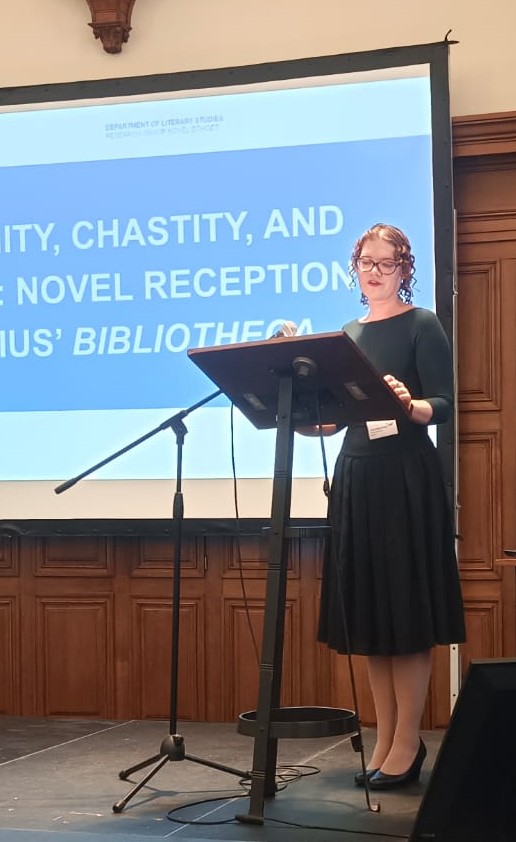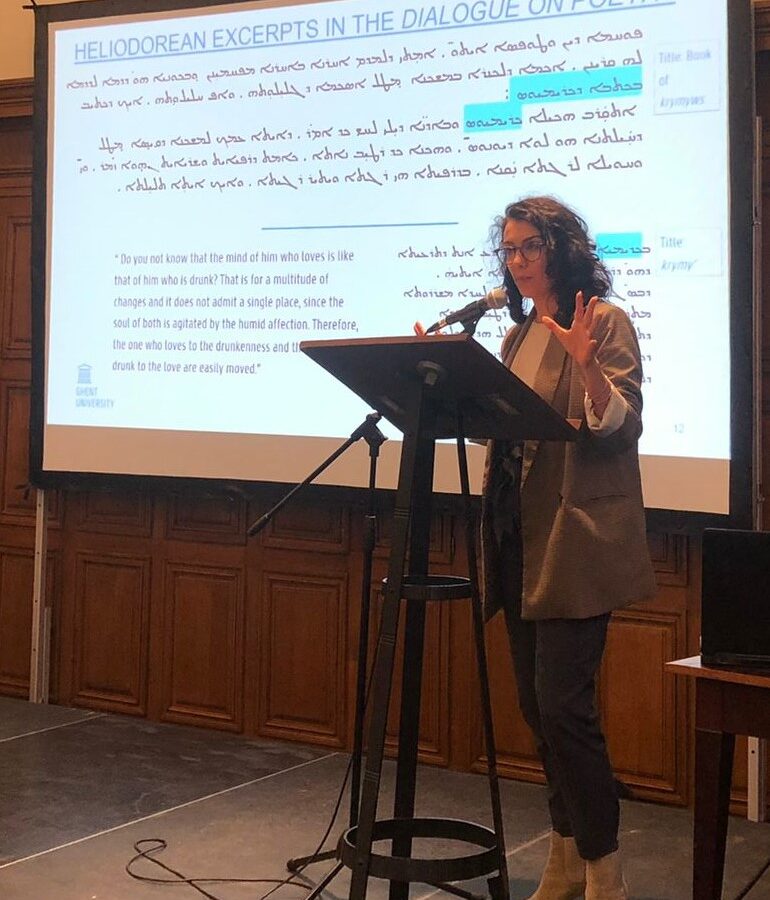— This blog post was written by Drs Claire Rachel Jackson and Mara Nicosia, postdoctoral researchers in the Novel Echoes project.
The sixth International Conference on the Ancient Novel (ICAN VI), which was hosted in Ghent at the end of September of last year, brought together 150 scholars from around the globe. These scholars all shared an interest in ancient novels and their study, but there is more. This conference had a meaningful subtitle: ‘roads less travelled’. This brief phrase was meant as an invitation to scholars who study either the transmission (both eastward and westward) of the novels or any topic that relates to the novels in less traditional ways. Therefore, for four days, a wide range of subjects was presented at the beautiful Thagaste monastery in Ghent city centre, where the conference was held, creating productive and energizing discussions among the participants, both in person and online. Here are the accounts of two travellers, describing their own path through these roads less travelled.
Traveller One: the experienced novel scholar. Claire Rachel Jackson

For a conference about roads less travelled, ICAN VI brought back a lot of memories of somewhere I’d been before. When I began studying the ancient novel, first as an undergraduate during a module on the origins of the modern novel at the University of Warwick and then as a postgraduate student at Cambridge, I’d found references in footnotes to the International Conferences on the Ancient Novel, but the snippets of information were tantalisingly elliptical. The one that stuck in my mind particularly was the mention of conference attendees going for a swim during the meeting to escape the heat, which, given that I undoubtedly read this in a cold library, sounded almost unbelievably idyllic. I’d still been at school during the fourth meeting, in Lisbon in 2008, but when ICAN V came around in 2015 I was a PhD student working on concepts of fiction in the ancient novel and eager to share my research with others in the field. In fact, I was so desperate to attend that when I got an email letting me know that my abstract had been accepted I was so excited that I began hyperventilating – only problem being that I was recovering from a bad chest infection and needed an inhaler to stop me from passing out. Occupational hazard!
Swimming through ICANs past
My main memories of ICAN V are the size and the heat, the jetlag and the excitement, the diversity of papers and the encounters with people I only knew from citations. The conference took place in a Hyatt hotel in Houston at the end of September, and I felt like I’d left the UK in the autumn only to arrive in summer. Despite taking place in a large hotel full of novel scholars, the atmosphere allowed both for bigger and inclusive discussions and more intense one-on-one meetings. There were a number of simultaneous panels going on throughout, and I remember sitting with a cup of coffee and the programme trying desperately to decide what to attend when everything sounded so interesting. While there were a number of papers about texts which fall squarely within the novelistic canon (including my own paper on fiction in Longus), I was particularly taken with those which tackled what was at least to me much more unfamiliar territory, including early modern receptions of the ancient novel, the novel in imperial epic, and interactions with hagiography. In a strange bit of foreshadowing, I attended a panel organised by the ERC-funded Novel Saints project in Ghent and ended up talking to some of the participants, not expecting in the least that I’d end up working with them on the subsequent Novel Echoes project a few years later… (And yes, there was swimming between papers, albeit on the sixth-floor outdoor pool of the hotel surrounded by Houston skyscrapers, but it still felt appropriate somehow.)
ICAN present
By contrast, ICAN VI in Ghent felt very different. Both were wonderful intellectual experiences but they came at very different times in my life. From a Hyatt hotel thousands of kilometres away from where I was based, now I was headed to a monastery across the city I was living in. Whereas at ICAN V in Houston I had felt very much like a tiny fish in a big pond, in Ghent I felt like I knew more of the people involved. This was both because I was further along in my career and had more opportunities to meet other scholars in the intervening period, and also because I’d been involved in reviewing abstracts and putting together the programme, which made papers and people feel oddly familiar. It also felt more intimate in part due to the experience of having lived through the global pandemic. While the Houston conference was a large event by any metric, this was perhaps not especially unusual in the pre-Covid world. ICAN VI, however, had to be postponed for a year due to the pandemic restricting our ability to gather a truly international group of scholars. This decision, although difficult at the time, paid off hugely, since September 2022 found travellers from as far away as California and Tokyo being able to meet in-person in Ghent. Yet the pandemic also made the experience all the more precious to be able to see old friends again and meet new colleagues, given how we’d all been forced apart for the last few years.
ICANs future?

But even though I was technically a seasoned traveller of the ICAN pathways, the conference was full of reminders of just how diverse the routes were by which we came together, and just how many new directions there were to cover. Ingela Nilsson, in the first keynote session of the conference, discussed her own experiences of attending ICAN for the first time at the third meeting in 2000, where her work on the Byzantine novels perhaps felt like a road less travelled for some attendees. This personal reflection on her own history with ICAN allowed her to probe at the limits of the term novel, and to think more about the porousness of the form within and across antiquity and modernity. By contrast, the second keynote session took the form of a roundtable about future directions for study of the novel. Convened by Tim Whitmarsh, the session brought together a variety of scholars, not just those working on novels, to discuss theoretical frameworks such as ecocriticism, race, and cognitive studies and their value for future novelistic studies. As the ensuing discussion proved, such approaches are not valuable only for how they can open up new aspects of these ancient texts, but also for how they generate dialogue across and between different texts and time periods. This was paralleled by the conference as a whole, with its diversity of papers on early Christianity, interactions with texts and cultures beyond the traditional Greco-Roman sphere, and Byzantine fiction. At the end of the Houston ICAN, I recall one venerable attendee noting that Lucian had not been mentioned as much as they expected, a reminder that no one conference can cover everything in detail, especially not a topic as broad-ranging and diverse as the novel. Yet between the two conferences, as well as in the scholarship done as a result of ICAN, it is clear that the roads less travelled are opening up a variety of new pathways, in literature and life.
Traveller Two: the first-time ICANer. Mara Nicosia

Since the beginning of my postdoctoral appointment as a member of the ERC project Novel Echoes in April 2021, I have heard my teammates talk about the organisation of ICAN and their plans for it. In all honesty, I did not know what to expect, as I had only attended conferences in my field since the beginning of my academic career. I am a scholar in Syriac studies, with a broad interest in Aramaic linguistics and Semitic philology, so I had never anticipated that I would stumble upon the novels. However, given that the only place where one finds short excerpts from Heliodorus’ Aethiopica in Syriac is the ninth-century rhetorical treatise written by Antony of Tagrit, and given that my research revolves around this very treatise, it was easy for me to be captivated by the Greek novels. However, my line of research places me at the fringes of the topic and it was quite hard for me to imagine that those who dedicated their lives to studying the novels would be interested in my research. It was during ICAN VI that I had the opportunity to change my mind and realize how the discipline was far more welcoming than I had anticipated. Moreover, I realised that many people were occupying a similar position to me on the “fringes” of the topic and that the subtitle of the conference, “roads less travelled”, was meant to invite us in.
Fringe in the centre
The number of topics that touched upon languages other than Greek and Latin was quite astonishing: from the Armenian reception of the Alexander Romance (Yvona Trnka-Amrhein) to the reception of the Novels in Syriac rhetoric (myself) and eastern hagiography (Simon Ford and Marion Pragt), to Persian (Cameron Cross) and Ethiopian (Steven Smith) receptions, as well as Japanese translations of the novels (Saiichiro Nakatani). There was a paper on the Talmudic seafarer stories compared with Greek paradoxographies (Monika Amsler) and a study of Meroitic reliefs of ritual killings of captives compared with similar scenes in the novels (Christopher Cochran).
Vessels

Naturally, not all the time was spent at the conference venue. The programme involved an opportunity for boat tours on the Schelde and Leie rivers, sightseeing in Ghent’s iconic historical city centre, a trip to Ghent’s famous castle – the Gravensteen – and of course no Belgian conference would be complete without a chance to taste Belgian beer, brewed in the very heart of Ghent!
After four days of conference, we came to realize that the beautiful vessel of the Greek novels is far richer than we had anticipated. We found ourselves amazed by the innumerable lines of inquiry that all our individual avenues of research open up, once brought together in one place. Moreover, ICAN allowed us to benefit from the discussion with “veterans” of the discipline and their expertise, to draw a map for future travellers and explorers of the novel world.